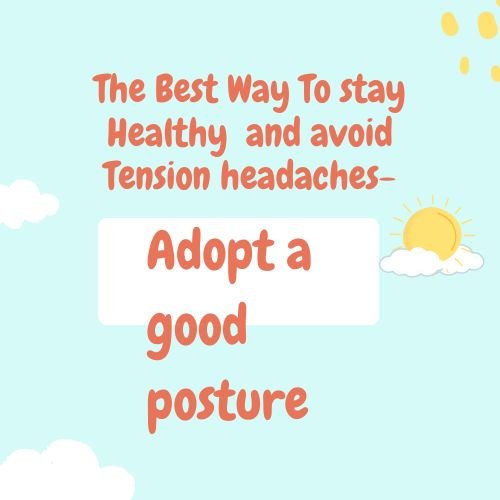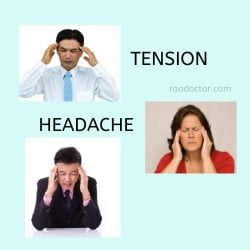
What is a Tension Headache?
If you wish to hear bout tension headache before reading you can listen to this audio clip while scrolling down-
A tension headache is a type of recurring headache that is not as severe as a migraine or a cluster headache. The pain associated with it can last anywhere from several hours to several days.
It is categorized as an “endogenous” headache, meaning that the source of the pain is located within the individual rather than being caused by something outside or external to the body.
Tension headaches are more common in women and people who experience stress on a regular basis. The best way to identify if you are dealing with tension headaches vs another type of headache is to understand what specific symptoms lead you towards one diagnosis over another.
This article covers everything you need to know about tension headaches, including their causes, symptoms, and treatments.
How to know you have this type of headache?
A tension headache is a type of recurring headache that is not as severe as a migraine or a cluster headache. The pain associated with it can last anywhere from several hours to several days.
As mentioned earlier, it is categorized as an “endogenous” headache, meaning that the source of the pain is located within the individual rather than being caused by something outside or external to the body.
Tension headaches are more common in women and people who experience stress on a regular basis and tend to occur more often among women than men. They are most common in those between the ages of 20 and 40.
There are several types of headaches that fall under the “tension headache” umbrella.
These include-
- a general headache with no specific symptoms,
- a headache that occurs only at the temples,
- a headache that occurs only on the top of the head,
- and a headache with pain across the entire head.
Causes of Tension Headaches
The exact causes of tension headaches are unknown, but the most widely accepted theory is that these headaches are caused by the contraction of the muscles in the head and neck.
Since there is no identifiable structural change in the brain that may be linked to tension headaches, it is likely that the contraction of muscles in the head and neck is the source of pain.
It may be caused by stress, poor posture, and muscle tension. Tension headaches are often worse when you are standing, sitting at a desk, or lying down.
There may be other causes of tension headaches that are as yet undiscovered, as many people have never been properly diagnosed or treated for their headaches.
Other theories include the build-up of toxins in the body and muscle inflammation.
Tension headaches may also be triggered by psychological factors such as stress or anxiety, poor sleeping patterns, poor diet, and poor posture.
Symptoms of Tension Headaches
Headaches are very subjective and difficult to treat, which is why it is important to be able to identify the type of headache you are having. This gives you the ability to better treat your headaches and prevent them from escalating into something more serious.
Warning signs of tension headache
Some warning signs of tension headache include muscle pain and stiffness, facial pressure, and tender spots on the skin that feel swollen or red.
Being able to identify the type of headache you are having will also help you to identify what the cause may be so that you can better prevent it from reoccurring.
The symptoms of tension headaches vary depending on which type of headache you are experiencing. The general type of tension headache is often described as a constant, dull pain that is not as severe as a migraine.
Tension headaches usually last less than 24 hours and can feel like pressure or a tight band around the head or neck. The pain may also be accompanied by-
- nausea,
- dizziness,
- sensitivity to light,
- and tenderness of the head or neck.
How to Treat Tension Headaches

The best way to treat tension headaches is to try to identify the underlying cause. This can be difficult, but once you know what is causing your headaches, you can take the appropriate steps to prevent it from happening again.
Some ways to treat tension headaches are:
– Relaxation techniques – There are many relaxation techniques that can help reduce the stress in your life and prevent these headaches from happening. Some examples are meditation, yoga, deep breathing, and visualization.
– Reducing stress – Stress is one of the biggest and most common causes of tension headaches. If you can reduce your stress, you can reduce your risk of getting tension headaches.

Ways to reduce your stress include getting a massage, going for a walk, or doing yoga.
– Good sleep – Having trouble sleeping is one of the most common symptoms of stress.

Getting enough sleep can greatly reduce the amount of stress in your life, which will help prevent you from getting tension headaches.
– Good diet – Certain foods can reduce the amount of toxins in your body, which can help prevent you from getting tension headaches.

Some of these foods are green tea, turmeric, apples, and lemon water.
– Good posture – Poor posture can cause muscle tension in the neck and head, which can lead to headaches.

Try to sit up straight and make sure you are not overusing your muscles.
How to prevent tension headache
In order to prevent tension headaches, it is helpful to understand their causes. Once you know what may trigger these headaches, you can take steps to reduce it as much as possible. Some ways to prevent tension headaches are:
– Reduce stress – This is the most common cause of tension headaches. Learn relaxation techniques and implement good sleep and diet habits to reduce your stress.
– Exercise – Exercising regularly can reduce stress and help prevent tension headaches. Try to get at least 30 minutes of exercise on most days of the week. It is recommended that you do exercise that is low impact to avoid putting too much strain on your joints and muscles.
– Improve your posture – Improving your posture can help you avoid unnecessary muscle tension.
– Practice good sleep habits – Getting enough sleep can help you avoid stress and reduce the risk of tension headaches. Try to go to bed at a consistent time every night and make sure your bedroom is as dark and quiet as possible.
When to see a doctor about your tension headaches
If your headaches are frequent or severe, you should see a doctor to rule out other causes of your headaches.
There are certain times when you should see a doctor immediately, such as:
– If you notice a sudden change in the frequency or severity of your headaches.
– If you have a headache that does not go away with over-the-counter medication.
– If you have a headache that is accompanied by unexplained weakness, numbness, or vision changes.
Medications for tension headache
If your headaches are more severe or last for a long period of time, it is important to see a doctor to rule out other causes. Doctors often prescribe over-the-counter medicines such as-
- acetaminophen (like Tylenol) or
- ibuprofen (like Advil) to help with the pain and inflammation of headaches.
I sometimes prescribe tramadol plus ketotifen combination like Ketotram MD[ mouth dissolving] tablet for instant relief.
Doctors may also prescribe a prescription pain medication to help reduce the pain in the short-term. Medical doctors may also prescribe preventative medication to reduce the number and severity of headaches.
Antidepressants like amitriptyline, topiramate, and venlafaxine are commonly prescribed for tension headaches. These medicines are to be taken strictly on the advice of your physician- he will prescribe you the appropriate medicine.
You can purchase these medicines by uploading a doctor’s prescription here in India-
- NetMeds
- TATA 1mg
Conclusion
A tension headache is a type of headache that is caused by muscle strain and is not as severe as a migraine or a cluster headache.
The pain associated with it can last anywhere from several hours to several days. It is categorized as an “endogenous” headache, meaning that the source of the pain is located within the individual rather than being caused by something outside or external to the body.
Tension headaches are more common in women and people who experience stress on a regular basis.
The best way to treat tension headaches is to understand what specifically causes them and then take the appropriate steps to prevent them from happening again.
Requesting a favor from you
If you have found this article, do send a review in the box below. Do opt to join my email list so that you can receive any new articles that I publish from time to time. Alternately, you can fill in the newsletter subscription form provided at the end of this article.
Adios.

